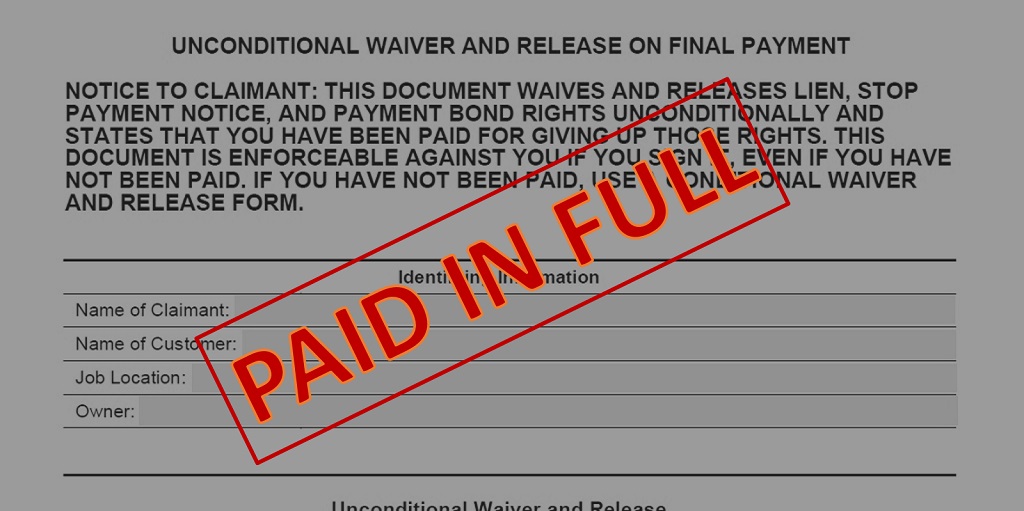Updated: April 30, 2023
The hallmark of a professional General Contractor is that he will provide the homeowner with a Mechanics Lien Waiver after payment has been made. Think of Mechanics Lien Waivers as “receipts” or proof that a homeowner has paid his bill in full for services rendered. The lien waiver also protects the homeowner financially against any future lien rights for payment for that contracted project.
Table of Contents
- What is a Mechanics Lien?
- What is a Lien Waiver?
- Who is the Claimant on a Lien Waiver?
- 4 Types of Mechanics Lien Waivers
- Lien Waiver Forms
- Related Articles
What is a Mechanics Lien?
In the event that a homeowner fails to pay a contractor the amount contracted, the contractor may file a Mechanics Lien on the property. This gives the contractor “Lien Rights” to the homeowner’s property. Contractors file a mechanics lien on the improved property as security to guarantee payment for their labor and materials, or value of the contract. The property can be foreclosed upon and thus sold to recover remaining funds due to the contractor via the equity in the property.
It is important to note that in many states, a lien can only be filed if there is a written contract between the lienholder and the homeowner.
What is a Lien Waiver?
A lien waiver is a document that releases all financial claims that a general contractor, subcontractor, materials or equipment supplier (Lienholder) may have against a homeowner for work performed as defined in a contract. In brief, the document states that the lienholder has waived his financial claims against the property. Once paid, the contractor or lienholder does not have lien rights.
Who is the Claimant on a Lien Waiver?
The claimant on a lien waiver form is the person or entity, such as a general contractor, subcontractor or supplier, who, with signature confirmation, waives their rights to file a lien on a homeowner’s property by virtue of receiving full payment for the services, products or materials provided.
It is important to note that if the lien waiver is between the general contractor (GC) and the homeowner, and if the GC fails to pay his subcontractors or suppliers, the subcontractors and suppliers can STILL file a mechanics lien against the homeowner’s property. Simply stated, a party’s Lien Rights may not be waived by other claimants. This means that the lien rights of subcontractors and suppliers may not be waived by the GC, or any other party up-the-chain.
Therefore it is important to obtain lien wavers from all possible lienholders on your project.
4 Types of Mechanics Lien Waivers
1. Conditional Waiver on Progress Payment
This is the safest waiver for claimants. This waiver generally specifies that if they have indeed been paid to date (and that includes no return or stopped payment checks) the waiver is an effective proof against any lien claim on the property.
2. Unconditional Waiver on Progress Payment
This waiver releases all claimant rights through a specific date unconditionally (and that includes no return or stopped payment checks).
3. Conditional Waiver on Final Payment
This waiver releases all claimant rights to file a mechanics lien if they have indeed been paid to date (and that includes no return or stopped payment checks).
4. Unconditional Final Waiver Final Payment
This the safest waiver for homeowners. This waiver generally releases all rights of the claimant to place a mechanics lien on the homeowner’s property unconditionally. It is immaterial if the payment check has been returned or stopped payment. Claimants should issue this type of release only when they are positive their work is done and the payment has cleared their bank. Owners should demand this release when they are paid in full. Some states allow an Unconditional Release upon final payment that is used to induce the final payment. It is an inherent vagary in the lien release law.
When you’re negotiating the contract, make sure that you are not only negotiating the terms of the contract, but also what the lien releases will look like when it comes time to sign them. Also make sure to obtain these releases from ALL possible lienholders once you have made your final payment.
Lien Waiver Forms
- Conditional and Unconditional Waiver and Release Forms
- Make A Free Mechanic’s Lien Waiver Form
- Free Lien Waiver Form Downloads for All 50 StatesWebsite
Articles Related to Lien Waivers
- Essential Elements of a Home Renovation Contract
- Home Renovation Contracts: Costly Mistakes to Avoid
- The Importance of a Punch List for Your Home Improvement Project
- When To Sign Your Construction Project Completion Form
- Key Concepts of Construction Warranties
| Purgula is reader-supported. When you click on links to other sites from our website, we may earn affiliate commissions, at no cost to you. If you find our content to be helpful, this is an easy way for you to support our mission. Thanks! Learn more. |







